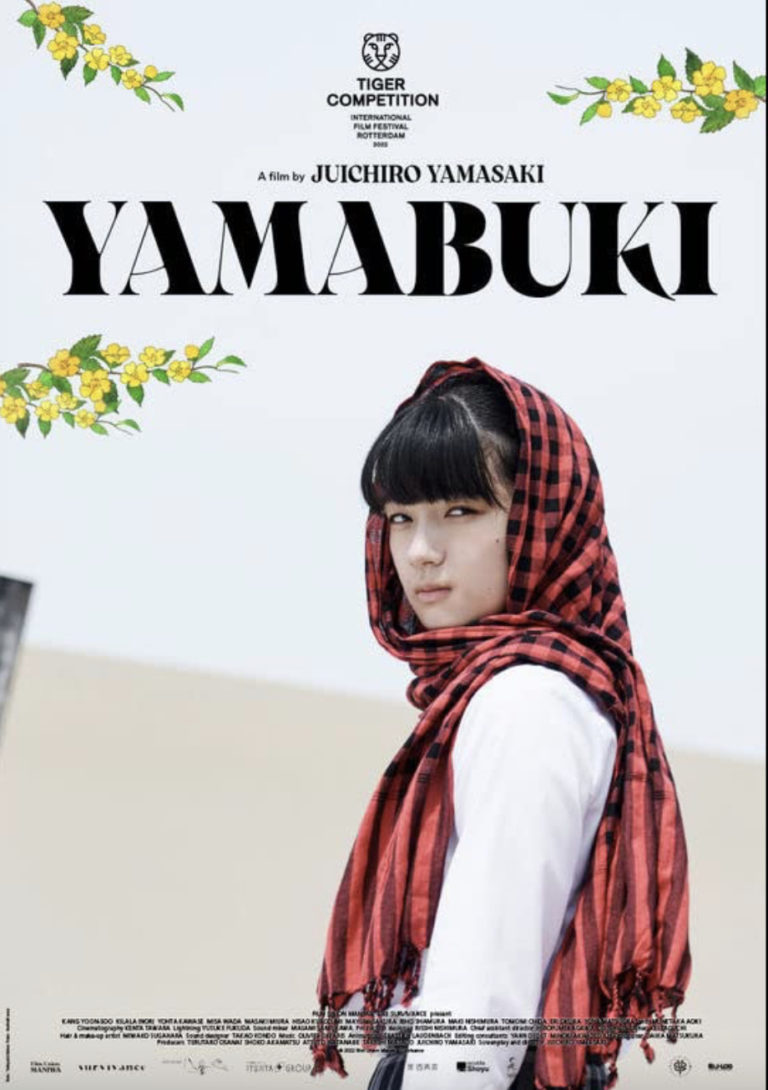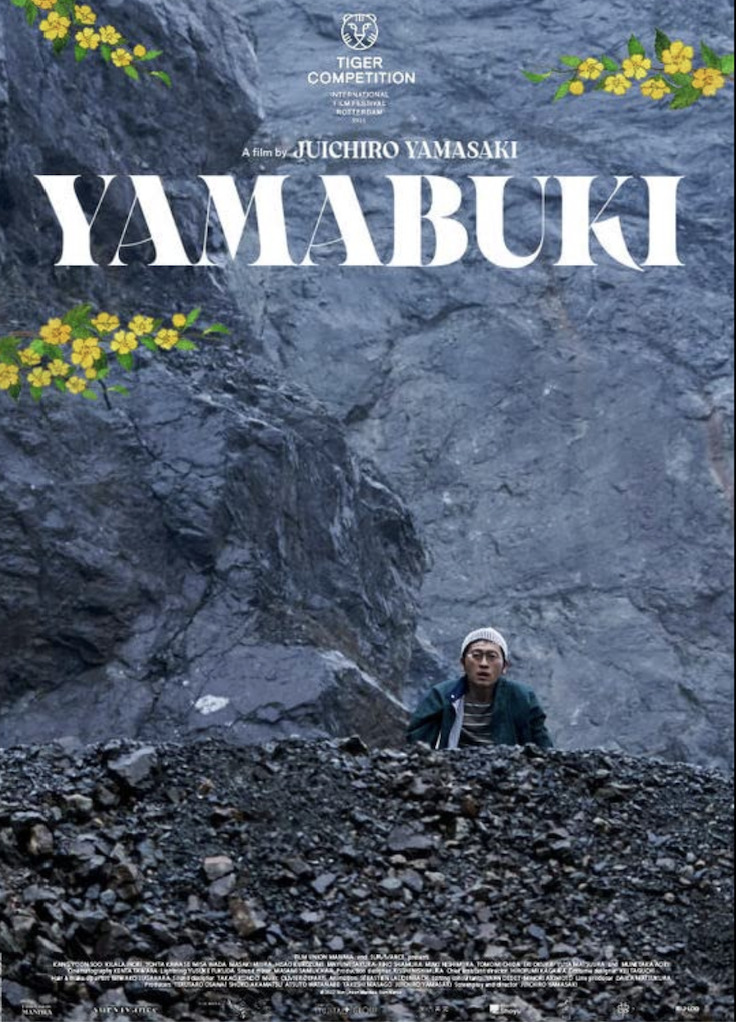
Q: You still live in Maniwa, Okayama, and this film was shot there. How was the environment of the land as reflected in your film?
Yamazaki: I don’t know if it’s unique to the land, but I guess so. It’s the same with my previous works. I also live there (Maniwa), so I have a grasp of things in the place I see every day. I know the history of the city and the culture of its people. I shoot where I can. If an actor comes to this land and performs here, I can judge that there may not be many things like this in this land. I don’t think it’s a unique area, I’m just living here. I live in a place called Maniwa, and it feels like I’m making a film from an observer’s point of view.
Q: The title of this film is “Yamabuki”, but “Yamabuki” is a flower that blooms on cliffs and is different from other flowers. How did you come to give the title of this work to your attention?
Yamazaki: It really blooms in the shadows, on the slopes of precipitous cliffs where the sun won’t hit them. In April, the flowers start to bloom one by one, but the shadows are dark, aren’t they? The yellow flowers in the middle look very shiny. It seems really beautiful. At first I didn’t know that the flower was Yamabuki. They bloom at the same time as the cherry blossoms, and are similar in size and shape to the cherry blossoms — the only difference is the color. People gather and have a party and admire the cherry blossoms, don’t they? In the same way, people don’t gather around Yamabuki, which I love. I was wondering if I could do something in contrast with cherry blossoms.
Q: Kang Yoon-soo, who played the main character, Chance this time, has a very friendly presence. What was the process in casting Kang Yoon-soo? There are some comedic elements to him even though he plays a serious role. He’s somehow balanced.
Yamazaki: First of all, Kang lives in Maniwa. While I was talking to him about various things, the opportunity came up for him to be a character so I wrote it into the script. While I was talking to Kang, I already knew that he was attractive and a theater person, so I thought that maybe Kang would go with me. I also started looking for other professional actors. However, in the end, I changed a couple of things and ended up hiring Kang. Kang himself is very positive and attractive. Chance in this scenario, has had tragic, irreparable misfortune happen to him. I wondered if Kang’s character could make such misfortune look a bit comical. If a Japanese actor played this part, it would become a story that couldn’t be saved, so I was careful about that.
Q : One of your characters, Chance, works at the quarry, and is supposed to be from South Korea. Are there Vietnamese workers at the Quarry? Are there many such foreign workers in Maniwa, Okayama?
Yamazaki: There are quite a few overseas workers. It’s gradually increasing. There’s also a community of Vietnamese people there and young Chinese, Indonesian, and so on.
Q: Are there any parts that you added to the script by actually interacting with those overseas workers?
Yamazaki: I may have been quite shallow here. This time, I didn’t do anything like actually communicating, just researching something like that.
Q: The movie “The Sound of Light (Hikari no Oto)” was featured at the Tokyo International Film Festival and the Rotterdam Film Festival.
The movie “Atarashiki Tami” was selected as the closing night film for the Japan Society event “Japan Cuts” in New York. Participating in overseas film festivals has increased. Are you influenced by these overseas film festivals and is that reflected in your work?
Yamazaki: It’s not just with overseas film festivals, but I’m really curious about the people’s reaction. This time too, the reactions of Americans are very easy to understand, so I try to watch [the films with] them. It’s not that I can or can’t get along because I’m a foreigner.
Q: Were there any American reactions that surprised you?
Yamazaki: There’s a scene where money is dropped off a cliff. That got a big laugh. Today, I went to see a comedy at the Spectacle Theater in Brooklyn, and when I watched it with the audience, they were laughing out loud. I think that these people really wanted to laugh. I thought it would make me laugh a lot.

Q: Munetaka Aoki, who has been active in various film and TV works, has also appeared in this film. How did you cast him?
Yamazaki: Aoki’s parents are from Maniwa, so he contacted me and said, “If there was anything I could do to help you, I would definitely want to appear in your film.” Since I’m busy, I could only go for a few days…so I felt like casting him.
Q: Kirara Inori and Munetaka Aoki have a lot of acting experience, but the other performers looked like they’re hired local people. How did you manage to bring those actors together?
Yamazaki: There are so many different types of actors. There are people who made offers from me, and there are also professional actors who came to auditions and were selected. There are also amateurs, and it feels like they are really mixed together. Since this time, I thought that I had to take the time to make a chance and a Yamabuki with a proper actor. As for the casting around me, I basically wanted to have people who could do it, and I decided, with a peace of mind, to leave it to them to do it freely.
Q: Actress Kirara has a certain presence just by standing still. What did you like about her that made you cast her?
Yamazaki: She’s been acting since she was a child, and has actually been on screen since she was in elementary school. However, I felt that she was already loved by the film industry, so I made an offer and had her do it.
Q: This time, you shot in 16mm, and paid for the budget on your own. How difficult was that during the filming process?
Yamazaki: It was really hard work. But right now, when it comes to budgets and being on set, it’s like a festival. The editing took about two and a half years. I was working on the details during the pandemic, so it was really hard, but I learned a lot. Once the film is released to the public, advertising costs will be incurred again.
Q : You still continue to grow tomatoes and make movies. Did you get an offer from another film production or distribution company to make a movie like this after your films, “the Sound of Light” and “Atarashiki Tami,” got picked up by the festivals?
Yamazaki: Agriculture is interesting, so if I can do it, I’m doing it. As for movies, I try to accept not only the film productions, but also movies for TV, workshops, and so on. I’ve done it a few times. However, if you do that kind of thing, the time for farming will be limited. That’s why we’re halving the tomato cultivation, since we don’t really know what the situation will be like in the future. I don’t particularly want to do this, but I’m not thinking of doing a big commercial movie next time.
Q: Do you want to create your own script rather than having someone else or a distributor write it for you?
Yamazaki: If there was such a job, I think I would do it, and I think I would be able to go. But basically, if you don’t have a strong desire to shoot the films, you won’t be able to hold it until it’s completed, or the first explosion. Otherwise, it’s really long, until I finish showing that independent film. I don’t think you can continue that far.
Q: “Yamabuki” was selected for the ACID section of the Cannes Film Festival. What was the reaction like at the Cannes Film Festival?
Yamazaki: It was grotesque [laughs]. I feel like there’s a lot of money flying around, and the categories are wide ranging, from the official category to the ACID category. In order to avoid being too commercial, Godard or Truffaut had suggested making a Director’s week or Critic’s week, so they’ll select works of high artistic quality, not just commercial films. Coming from such a place, the ACID division gradually became possible, and its range was very wide. I was glad that I was selected from the ACID section. It’s nice to have the deepness of the French movie, or the feeling of silence.
Q: What, if any, influences do you have from American movies?
Yamazaki: I’m sure there are good works from the 30’s, 40’s, 50’s, etc., but if you would ask me about American film as a whole… In terms of filmmakers, I’ve mostly seen the works of John Ford, and more recently, Frederick Wiseman’s documentaries. He shoots from multiple perspectives and doesn’t judge — the perspective is left to me, the viewer. I like Eastwood too. Eastwood might be seen as having a total aesthetic but I prefer his work as he gets older.
Q: Ryusuke Hamaguchi (“Drive My Car”) and Koji Fukada (“Love Life”) are credited in this work. What sort of communication did you have with those filmmakers?
Yamazaki: Hamaguchi-san and I got together in China for the movie “The Sound of Light” (Hikari no Oto). We stayed overnight at the same organizer’s house, and talked about various things, exchanging opinions, and playing together. I told him what I like there, sometimes I get scolded, he gets annoyed. But he’s rooting for me while I’m making my films. He wrote a message for crowdfunding again this time, and he’s the same age as me.
That’s why I feel like we’re in the same generation, so if something happens, we’ll interact from time to time.
Q: What kind of work do you have planned for the future?
Yamazaki: I’m not sure. I talked about this last time, but I think it’s a musical, or something like a comedy. It’s not an explanation, but an intuition. Rather than going in the direction of an Indian film or something like that, I have a vague feeling that it’s rooted in the local community.

Check out more of Nobuhiro’s articles.
Here’s the trailer of the film.

